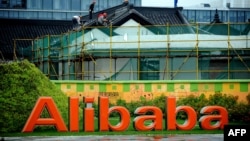A China regulator has accused Alibaba Group Holding Ltd of failing to clean up what it called illegal business deals on the e-commerce titan's platforms, in an unusually strong government criticism of one of the country's biggest private firms.
The State Administration for Industry and Commerce (SAIC), in a report published on its website on Wednesday, said many products sold on Alibaba's e-commerce websites and services infringed upon trademarks, were substandard or fake, were banned or endangered public security.
The report was later removed from the main page of the SAIC website.
Alibaba declined to comment on the report. SAIC said the report summarized a July 16, 2014, meeting between government business regulators and Alibaba, and that it had delayed releasing the report to avoid affecting the e-commerce firm's initial public offering, which took place in September.
SAIC did not elaborate. Alibaba, which raised a record-setting $25 billion from its New York IPO, is due to release its quarterly results on Thursday.
"Alibaba Group has long paid insufficient attention to the illegal business activities on Alibaba platforms," the SAIC report said. Alibaba "let that abscess fester until it became a danger", it added.
The report said Alibaba officials, for their part, pledged during the July meeting to take the necessary steps to rectify the problems. The SAIC has a broad supervisory role over online trading platforms and business in China.
Alibaba, which until a few years ago was on a U.S. list of "notorious markets" for intellectual property infringement, has fought hard to tackle counterfeit products to keep its reputation from being tarnished in the run-up to, and after, the IPO, the world's biggest ever listing.
Earlier this month, it agreed with the U.S. Consumer Product Safety Commission to stop the sale of up to 15 illegal or dangerous toys in the United States. Online fakes, however, remain a big problem in China.
Joe Simone, director of Hong-Kong based intellectual property consultancy SIPS, said the regulator's comments about counterfeit goods were no surprise. "The frankness of the report and its condemning tone are unprecedented and speak volumes about what the SAIC found in its inspection," he added.
In the report, the regulator said Alibaba had misled consumers during sales events, including its popular Nov. 11 annual "Singles Day" shopping extravaganza.
At last year's event, Alibaba reported a surge in sales transactions to a record high of $9 billion, but merchants told Reuters in they felt pressure from Alibaba's Tmall to boost their figures on the day with heavy discounts and delayed recognition of earlier sales.
On Wednesday, Alibaba's consumer-to-consumer shopping website Taobao said it would lodge a complaint with the SAIC over a separate investigation by the regulator that allegedly uncovered a range of counterfeit products on the site.





